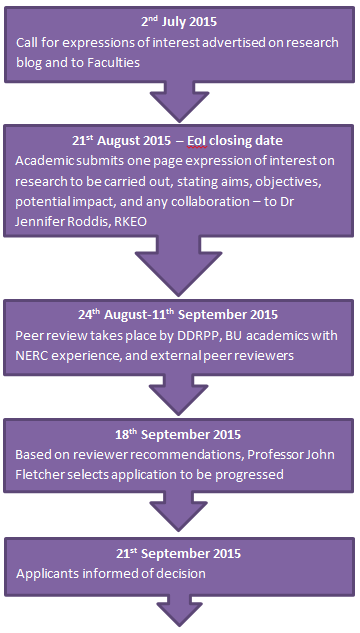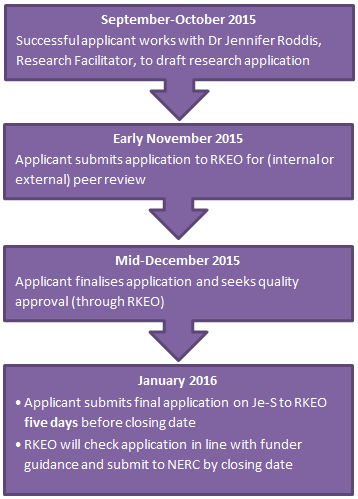 NERC introduced demand management measures in 2012. These were revised in 2015 to reduce the number and size of applications from research organisations for NERC’s discovery science standard grant scheme. Full details can be found in the BU policy document for NERC demand management measures at: http://intranetsp.bournemouth.ac.uk/policy/BU Policy for NERC Demand Management Measures.docx.
NERC introduced demand management measures in 2012. These were revised in 2015 to reduce the number and size of applications from research organisations for NERC’s discovery science standard grant scheme. Full details can be found in the BU policy document for NERC demand management measures at: http://intranetsp.bournemouth.ac.uk/policy/BU Policy for NERC Demand Management Measures.docx.
As at March 2015, BU has been capped at one application per standard grant round. The measures only apply to NERC standard grants (including new investigators). An application counts towards an organisation, where the organisation is applying as the grant holding organisation (of the lead or component grant). This will be the organisation of the Principal Investigator of the lead or component grant.
BU process
As a result, BU has introduced a process for determining which application will be submitted to each NERC Standard Grant round. This will take the form of an internal competition, which will include peer review. The next available standard grant round is July 2018. The process for selecting an application for this round can be found in the process document here – the deadline for internal Expressions of Interest (EoI) which will be used to determine which application will be submitted is 28th March 2018. The EoI form can be found here: I:\R&KEO\Public\NERC Demand Management 2018.
NERC have advised that where a research organisation submits more applications to any round than allowed under the cap, NERC will office-reject any excess applications, based purely on the time of submission through the Je-S system (last submitted = first rejected). However, as RKEO submit applications through Je-S on behalf of applicants, RKEO will not submit any applications that do not have prior agreement from the internal competition.
Following the internal competition, the Principal Investigator will have access to support from RKEO, and will work closely with the Research Facilitator and Funding Development Officers to develop the application. Access to external bid writers will also be available.
Appeals process
If an EoI is not selected to be submitted as an application, the Principal Investigator can appeal to Professor Tim McIntyre-Bhatty, Deputy Vice-Chancellor. Any appeals must be submitted within ten working days of the original decision. All appeals will be considered within ten working days of receipt.
RKEO Contacts
Please contact Rachel Clarke, RKEO Research Facilitator – clarker@bournemouth.ac.uk or Jo Garrad, RKEO Funding Development Manager – jgarrad@bournemouth.ac.uk if you wish to submit an expression of interest.


















 Upcoming opportunities for PGRs – collaborate externally
Upcoming opportunities for PGRs – collaborate externally BU involved in new MRF dissemination grant
BU involved in new MRF dissemination grant New COVID-19 publication
New COVID-19 publication MSCA Postdoctoral Fellowships 2024
MSCA Postdoctoral Fellowships 2024 Horizon Europe News – December 2023
Horizon Europe News – December 2023